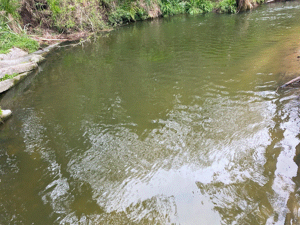A Rotorua dairy farm has been convicted and fined $40,000 for an illegal dairy effluent discharge from a travelling irrigator.
Chlorofield Limited pleaded guilty to the charge.
Toi Moana Bay of Plenty Regional Council regulatory compliance manager Matthew Harrex says Regional Council was notified about the dairy effluent discharge by a member of the public, who noticed the normally clear stream was a green, brown colour.
Regional Council staff followed up the complaint that afternoon and checked the nearest dairy farm upstream.
They discovered that a travelling irrigator had failed and dairy effluent was ponding, before flowing over the land and into the Waitetī Stream.
“Waitetī Stream is culturally important to Ngāti Ngāraranui and regionally significant, supporting a number of freshwater species,” says Harrex. “It is also a trout breeding habitat and popular swimming spot. Unfortunately, this event has led to approximately 4 to 6 cubic metres of effluent making its way into the stream and, eventually, Lake Rotorua.”
He says the irrigator’s drag hose came apart at a join after it was incorrectly set up without enough drag hose to complete its run.
“Fail safe detection equipment would have picked up that the hose was coming apart and prevented the spill by immediately turning off the pump,” he says. “It’s disappointing they didn’t have this basic infrastructure in place. We can’t emphasise enough the importance of investing in adequate technology to manage these risks.”
Judge Smith says that irrigators constantly fail and it is to be expected.
“The litany of cases before this Court proves that travelling effluent irrigators require not only constant supervision, but a series of fail-safe devices to try to mitigate the effect of any untoward discharge. This irrigator did not have any fail-safe devices at all which I find, frankly, quite outstanding.
“The next feature of this offending is that the environment in which the discharge occurred is particularly sensitive. The stream itself is a trout stream and, therefore, has high values and feeds into Lake Rotorua eventually,” Judge Smith says.
Smith went on to explain that Lake Rotorua has been subject to Government and other interventions to try to reduce the nutrification of the lake.
“That includes a diversion from Lake Rotoiti to avoid the water flowing into that lake and directing exit through the river,” says Judge Smith.
Judge Smith’s starting point for sentence was a $60,000 fine. He allowed discounts for guilty plea, remorse and lack of prior convictions resulting in the final sentence of a $40,000 fine.


















